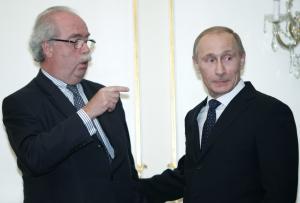By Simon Black
October 21, 2014
Santiago, Chile
I walked in the door this morning to my apartment in Santiago, happy to be back in Chile after a week away.
(One of the things that I really love about this place is the weather. The weather forecast in the entire central region of Chile is typically just a string of yellow circles. Yet it's not so hot that you need air conditioning. I love it.)
But my mood was quickly spoiled when my maid handed me an envelope.
"It looks official," she said, staring at me to gauge my reaction. She was right. The sender was the United States Department of Treasury.
Clearly my first thought was wondering why the US government was sending me anything, especially to my apartment in Santiago. My second thought was utter astonishment that the US Postal Service had managed to get it here!
I ripped it open and found... a check. Made out to me. It was my tax refund.
As an aside, I'll tell you that living overseas has a lot of huge benefits. One of them is that your taxes are almost always going to be lower.
If you're American, you can earn up to $99,200 in foreign income, tax free. This amount goes up every year (not that there's any inflation).
If you're married, you and your spouse can BOTH claim the foreign earned income exclusion, meaning you can earn nearly $200,000 as a couple, tax free.
And when you include the additional deduction you can receive on foreign housing, your total tax benefit living overseas can easily be upwards of $250,000 or more.
Just imagine being able to put an additional $250,000 in your pocket each year, instead of giving that money to a bankrupt government to finance drones, bombs, and body scanners. (More on this in another letter...)
In my case, I have income from other sources, including certain investment income that still gets taxed. And just to be on the safe side, I ALWAYS overpay my taxes, so our friends at the IRS send me a refund each year.
This is the first year in ages that I remember receiving a physical check; I must have forgotten to fill out the direct deposit section of the 1040.
And while checks seem like vestigial relics of a financial era long gone, it's not a big problem to deal with down here. Chileans really like checks, and it turns out that a number of Chilean banks we deal with are more than happy to immediately clear foreign checks from the US.
Then I glanced back at the envelope. It said, "Forgery or endorsements on Treasury checks is a Federal crime. Maximum penalty is a $10,000 fine and ten years in imprisonment."
Wow. In the Land of the Free, you can't even deposit a tax refund check without being threatened with fines and imprisonment. It's unreal.
We've talked about this before. Even the most basic, innocuous tasks now involve threats and intimidation.
If you apply for a passport on form DS-11, the government threatens you with "fine and/or imprisonment under U.S. law including the provisions of 18 U.S.C. 1001, 18 U.S. C. 1542, and/or 18 U.S.C. 162."
Applying for a social security replacement card threatens you with "penalty of perjury".
Applying for a driver's license in my home state of Texas threatens me with "five years in prison and/or a $250,000 fine."
And of course, the instruction book for IRS form 1040 includes an entire section threatening anyone about to file his/her taxes with civil, criminal, and administrative penalties.
There's very little you can do in the Land of the Free that doesn't involve the threat of fines and imprisonment anymore, including simply depositing a check.
They've criminalized almost every aspect of existence. EVERYTHING—how your children are educated, the purchasing power of your savings, the privacy of your email, what you can/cannot put in your body-- is regulated by the state.
Any deviation from the standards that they establish is criminalized. And they shove these threats in our faces at every opportunity.
The idea of a government for the people, by the people, of the people... has long been lost. They don't even pretend to serve the people anymore... it's just threats and intimidation.
This is not how a free society is supposed to operate. And as we explored inyesterday's podcast, it's a sign of the top.
We have reached peak government. Like any bubble, this one is about to burst.
Until tomorrow,

Simon Black
Senior Editor, SovereignMan.com
October 21, 2014
Santiago, Chile
I walked in the door this morning to my apartment in Santiago, happy to be back in Chile after a week away.
(One of the things that I really love about this place is the weather. The weather forecast in the entire central region of Chile is typically just a string of yellow circles. Yet it's not so hot that you need air conditioning. I love it.)
But my mood was quickly spoiled when my maid handed me an envelope.
"It looks official," she said, staring at me to gauge my reaction. She was right. The sender was the United States Department of Treasury.
Clearly my first thought was wondering why the US government was sending me anything, especially to my apartment in Santiago. My second thought was utter astonishment that the US Postal Service had managed to get it here!
I ripped it open and found... a check. Made out to me. It was my tax refund.
As an aside, I'll tell you that living overseas has a lot of huge benefits. One of them is that your taxes are almost always going to be lower.
If you're American, you can earn up to $99,200 in foreign income, tax free. This amount goes up every year (not that there's any inflation).
If you're married, you and your spouse can BOTH claim the foreign earned income exclusion, meaning you can earn nearly $200,000 as a couple, tax free.
And when you include the additional deduction you can receive on foreign housing, your total tax benefit living overseas can easily be upwards of $250,000 or more.
Just imagine being able to put an additional $250,000 in your pocket each year, instead of giving that money to a bankrupt government to finance drones, bombs, and body scanners. (More on this in another letter...)
In my case, I have income from other sources, including certain investment income that still gets taxed. And just to be on the safe side, I ALWAYS overpay my taxes, so our friends at the IRS send me a refund each year.
This is the first year in ages that I remember receiving a physical check; I must have forgotten to fill out the direct deposit section of the 1040.
And while checks seem like vestigial relics of a financial era long gone, it's not a big problem to deal with down here. Chileans really like checks, and it turns out that a number of Chilean banks we deal with are more than happy to immediately clear foreign checks from the US.
Then I glanced back at the envelope. It said, "Forgery or endorsements on Treasury checks is a Federal crime. Maximum penalty is a $10,000 fine and ten years in imprisonment."
Wow. In the Land of the Free, you can't even deposit a tax refund check without being threatened with fines and imprisonment. It's unreal.
We've talked about this before. Even the most basic, innocuous tasks now involve threats and intimidation.
If you apply for a passport on form DS-11, the government threatens you with "fine and/or imprisonment under U.S. law including the provisions of 18 U.S.C. 1001, 18 U.S. C. 1542, and/or 18 U.S.C. 162."
Applying for a social security replacement card threatens you with "penalty of perjury".
Applying for a driver's license in my home state of Texas threatens me with "five years in prison and/or a $250,000 fine."
And of course, the instruction book for IRS form 1040 includes an entire section threatening anyone about to file his/her taxes with civil, criminal, and administrative penalties.
There's very little you can do in the Land of the Free that doesn't involve the threat of fines and imprisonment anymore, including simply depositing a check.
They've criminalized almost every aspect of existence. EVERYTHING—how your children are educated, the purchasing power of your savings, the privacy of your email, what you can/cannot put in your body-- is regulated by the state.
Any deviation from the standards that they establish is criminalized. And they shove these threats in our faces at every opportunity.
The idea of a government for the people, by the people, of the people... has long been lost. They don't even pretend to serve the people anymore... it's just threats and intimidation.
This is not how a free society is supposed to operate. And as we explored inyesterday's podcast, it's a sign of the top.
We have reached peak government. Like any bubble, this one is about to burst.
Until tomorrow,

Simon Black
Senior Editor, SovereignMan.com




-1.png)



